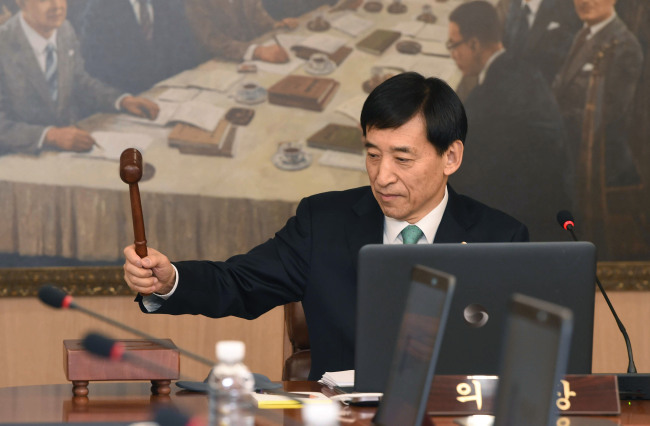South Korea's central bank on Thursday held its key rate steady for April as Asia's fourth-largest economy is experiencing low inflationary pressure and a weaker pace of economic recovery.
In a widely expected move, the monetary policy board of the Bank of Korea voted to keep the policy rate unchanged at 1.5 percent, extending its wait-and-see stance to five months.
In November last year, South Korea's central bank adjusted up the key rate for the first time in more than six years, citing signs of economic recovery.
"As it is forecast that inflationary pressures on the demand side will not be high for the time being, while the domestic economy is expected to continue its solid growth, the board will maintain its accommodative monetary policy stance," the central bank said in a statement. "In this process it will judge carefully whether it is necessary to adjust its accommodative monetary policy stance further, while closely checking future economic growth and inflation trends."
It said the decision was made unanimously by seven board members, including BOK Gov. Lee Ju-yeol.

BOK Governor Lee Ju-yeol (Yonhap)
The rate freeze was in line with the market consensus, as many anticipated that South Korea's chronic low inflation pressure would keep the central bank from tightening its monetary policy in earnest.
The country's consumer prices climbed 1.3 percent on-year in the first quarter of this year, lower than the BOK's quarterly target of 1.5 percent.
Also, BOK Gov. Lee has stressed that he would keep monetary policy accommodative to support economic growth. The latest meeting was Lee's first rate decision since he started his second four-year term on April 4.
"Looking ahead it is forecast that consumer price inflation, after remaining at the mid-1 percent range for some time, will pick up and gradually approach the target level from the second half of this year," said the BOK. "For the year overall, consumer price inflation is expected to be slightly below the 1.7 percent level projected in January."
Market watchers said the South Korean economy will face intensifying downside risks this year, including trade pressure from the United States and potential fallouts from ongoing corporate restructuring efforts.
The government earlier announced a plan to map out a 4 trillion won ($3.75 billion) supplementary budget to ease the tightened job market, as the unemployment rate reached 4.5 percent last month, marking the highest number among all March figures over the past 17 years. In particular, the jobless rate for young adults hit 11.6 percent.
Also, uncertainties are building around the world, and in the Northeast Asian economy, due to the possibility of a trade war between the United States and China. The world's biggest and second-biggest economies are South Korea's No. 1 and No. 2 trade partners.
Moreover, the strengthening of the local currency, which touched a more than three-year high against the US dollar last week, will likely undermine price competitiveness of South Korean goods in the global market.
Some experts said the lower-than-expected consumer prices may postpone the BOK's schedule to raise the key rate a couple of times this year.
Currently, South Korea's base rate is lower than that of the United States for the first time in more than 10 years following a rate hike by the Federal Reserve in March.
Many are worried that the rate imbalance between South Korea and the US could spark an outflow of foreign capital, which accounts for over 30 percent of stock holdings in Asia's fourth-largest economy. (Yonhap)






